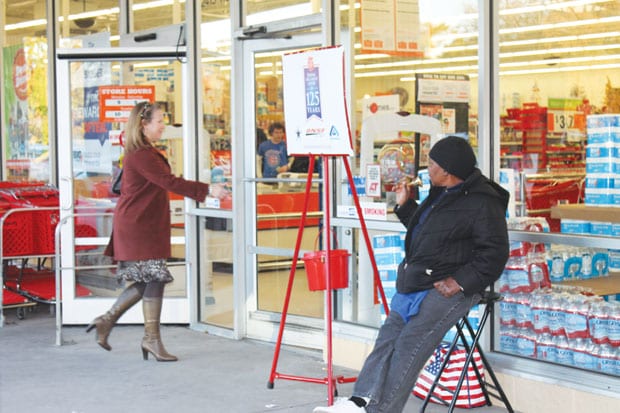Service center director says the organization is speaking out about accepting the LGBT community, including a video campaign

DING DONG | A Salvation Army bell ringer sits outside Big Lots at Cityplace Market this week. Bell ringing begins on Thanksgiving and ends on Christmas Eve. (Anna Waugh/Dallas Voice)
While many LGBT advocates are withholding their spare change from The Salvation Army’s red kettles this holiday because of perceived anti-gay views, the local Dallas shelter says they are anything but anti-gay.
Blake Fetterman, operations director at Carr P. Collins Social Service Center, said her facility helps anyone with housing and food needs regardless of sexual orientation and gender identity.
When transgender people come into the center, she said they’re asked what their preferred name is, how they identify and which shelter they’d feel comfortable in.
With the men’s shelter being more like military barracks with open living and shower areas, she said some trans people feel more comfortable in the women’s shelter because it’s more private.
The Salvation Army is an international organization and follows Christian Church doctrine. Its mission statement reads in part, “Its message is based on the Bible. Its ministry is motivated by the love of God. Its mission is to preach the gospel of Jesus Christ and to meet human needs in
His name without discrimination.”
“Our mission is to provide services without discrimination,” Fetterman said. “It’s right there in our mission. I don’t know if any organization this large would survive if it didn’t follow its mission.”
The U.S. Salvation Army is divided into four territories, and the Southern Territory, based in Atlanta, includes sexual orientation and gender identity and expression in its nondiscrimination policy. The Southern Territory covers 15 states, including Texas.
Fetterman said whenever she’s approached about working for the organization because of their anti-LGBT views, she uses it as an opportunity to inform people about how her center treats people.
“I have to help by changing the dialogue,” she said. “It’s just not who we are.”
The Dallas center was recently recognized in October when its staff and clients were featured in a national nondiscrimination video, explaining how the organization treats members of the LGBT community.
PJ Snyder, who was featured in a Dallas Voice cover story about domestic violence services in Dallas earlier this year, was featured in the video.
She came from Oklahoma to escape her abuser and found accepting refuge at the Collins Center after negative experiences at other shelters because she is gay.
Snyder said her experiences at other shelters made her hesitant to come out at Salvation Army shelters since other shelters tried to use religion to change her.
“At the other ones, I got called everything from the resident fairy to being asked to change who I am,” she said. “There were other shelters at Salvation Army that I worried about coming out, and they were very receptive and they were actually shocked I didn’t feel comfortable.”
She said her experience in the shelter, financial classes and job skill training was “very positive.”
“They don’t treat you differently,” Snyder said. “It’s positive because you’re treated as everyone else is.”
Fetterman said the anti-gay views many people associate with the Salvation Army has come up every year, especially around the holidays, and she’s glad the video shines light on the inclusive work its staff does.
“These assumptions and these rumors have been out there for some time, and they’re not going away,” she said. “My belief is the Salvation Army has been silent long enough.
“It was just an honor,” Fetterman added about the Dallas location being selected to participate. “I hope the Dallas Salvation Army can be a representation of the Salvation Army worldwide.”
The Salvation Army has a storied anti-gay past. It turned down contracts with the city of San Francisco in 1998 because of the city’s nondiscrimination ordinance. It did the same thing in 2004 with New York City.
And in 2001, the organization tried to make a deal with the Bush administration that made religious charities that received federal funding exempt from local nondiscrimination ordinances. But the deal fell through after The Washington Post reported on it.
And while the Salvation Army has recently removed links to “ex-gay” ministries from its website, links to Harvest USA and Pure Life Ministries were once listed under a section on how to deal with sexual additions. Just last year, a caseworker in Vermont was fired after she came out as bisexual. The employee handbook states that the organization can make employment decisions if an employee’s behavior is contradictory to its principles. A spokesman later said same-sex relationships are “against the will of God.”
Fetterman said the views of one individual doesn’t reflect the views of the organization’s majority and how progressive the organization has become in the five and a half years she’s worked at the Dallas location.
She said she encourages people who think negatively of the organization to check with their local shelter about its LGBT policies instead of assuming a Salvation Army location won’t accept or help them.
“Because of these rumors, what I worry about is people not getting served, is people from the LGBTQ community not seeking services because they think they won’t get served,” Fetterman said. “This is hurting people.”
To watch the Salvation Army’s nondiscrimination video, go here.
This article appeared in the Dallas Voice print edition December 20, 2013.
















